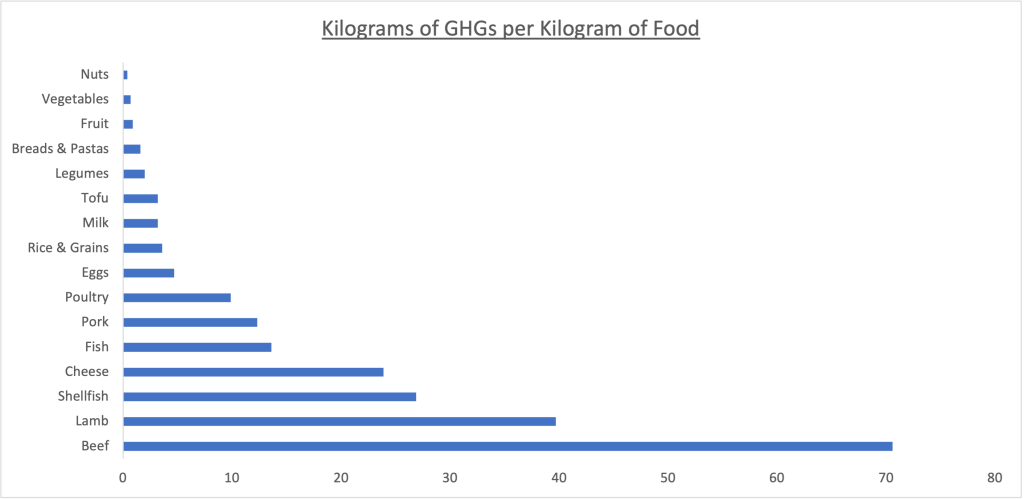How Your Diet Affects The Planet

The planet is in peril and our global food system is failing. Our current system involves taking food from farm to fork. Food needs to be grown and processed, transported, distributed, prepared, eaten and often wasted. Each stage in the food supply chain creates emissions that contribute to climate change. Approximately, 30% of global greenhouse gases (GHG) are derived from the current food system.
In turn, climate change is affecting our food system and our health. Increasing GHGs are making it substantially harder to produce food, through rising temperatures, floods, droughts, and unpredictable weather. For example, drought in Kenya has resulted in 50% less production of their staple food, maize, whilst floods in Australia are sweeping away herds of animals and damaged crops. Globally, one in five deaths, is attributable to poor diets, which is only going to get worse with extreme weather patterns. Additionally, climate change is contributing to food shortages and higher food prices. Inequities in food production means most people cannot access healthy food. Around 2 billion people face food and nutritional insecurity. Poor quality food is driving diet-related conditions such as obesity, heart attacks and many other health related issues.
It is time for a reboot. By 2050, the world will need to feed two billion more people, whilst supporting our climate challenges. Here are 7 tips to help us eat healthily and sustainably.
Eat More Plants
Animal farming for meat and dairy requires an enormous amount of land, water, and feed. Livestock farming alone contributes 15% to GHGs and contributes 77% of all agricultural land use. Meat production often requires extensive grasslands, often created through deforestation. Plant-based foods, use far less energy, land, and water, substantially lowering our GHGs. Clearly, we need to rebalance our diets by reducing animal products and focusing on healthier plants.

Eat Different Foods
Three quarters of the world’s food supply comes from 5 animals and 12 plants. Greater options exist and diversity in our diets is vital. Eating the same food is bad for our natural resources and a threat to food security.
Eat Sustainable Fish & Seafood
Over 95% of fish stocks are overfished, whilst aquaculture has significant sustainability concerns. Shrimp farms, as an example, occupy coastal lands that were once mangrove forests, which used to absorb significant amounts of carbon. Mangroves that are now used to create shrimp farms, have lost their carbon absorption capacities. Try consuming a diversified species of fish and a lower GHG emitting seafood.
Waste Less
The UK throws away £17 billion of food ever year. Approximately, 30% of food is wasted. If food waste was a country, it would be a 3rd largest emitter of GHGs. To reduce waste think about how you buy, prepare, and dispose of food. Buy what you need and try to be creative with leftover food. If you need to throw out food, compost your leftovers, which can reduce the amount of methane and GHGs.
Minimise Plastic Use
Plastic is everywhere. Try using a reusable bag and opt for packaging-free products where possible. Other tips include avoiding cling film, using reusable coffee cups, bring your own water bottle and avoid chewing gum.
Eat Locally and In Season
Modern eating habits demand food all year round, which means a variety of fruits and vegetables being flown from across the world. When you buy out of season food, it must travel a long distance or is grown in energy sapping conditions. This makes it more costly. Try and eat locally and in season. This requires fewer production costs and a lower price.
RSPO Palm Oil
Palm oil is in everything, close to 50% of packaged products. Over 85% of palm oil is grown in Indonesia, Malaysia, and Papa New Guinea. It is responsible for large-scale deforestation, putting wildlife under considerable threat of extinction, as well as contributing to GHGs. When buying food, keep an eye out for RSPO certified palm oil, as this offers a substantially lower carbon footprint.
